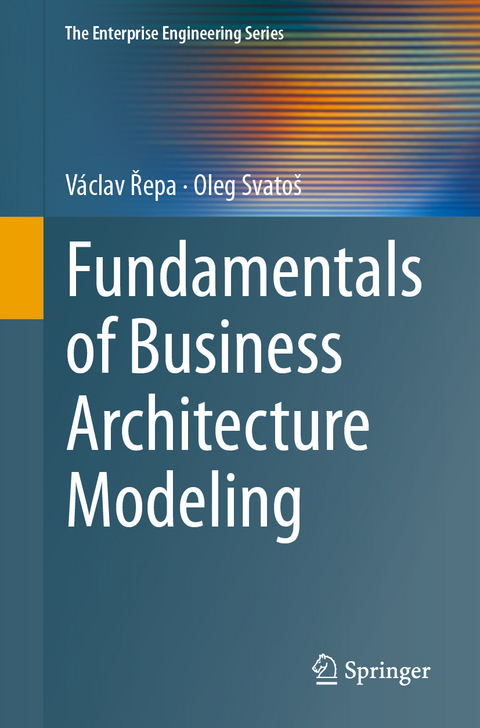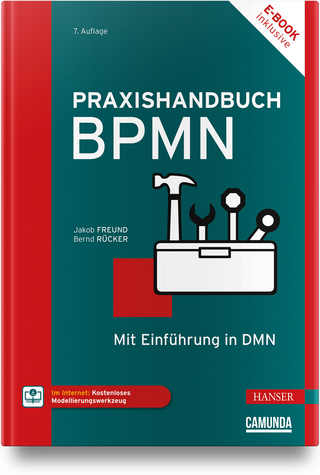
Fundamentals of Business Architecture Modeling
Springer International Publishing (Verlag)
978-3-031-59034-4 (ISBN)
This textbook covers business architecture modeling in all its essential aspects. Based on the MMABP Philosophical Framework for Business System Modelling it provides a comprehensive overview of four basic dimensions of the business system model together with their essential relationships. The methods, techniques, and tools are described and explained for every model type with examples. Special attention is paid to integrating all dimensions using the Business System Consistency Framework.
The book is divided into six chapters. Chapter 1 introduces business architecture and the approaches and tools to model it. MMABP is introduced with its basic principles and put in context with other approaches to business architecture modeling. Chapter 2 then deals with the modeling of a business system in terms of its objectives. The basic principles of process modeling, the distinction between global and detailed views of processes, and an approach to managing the detail of the process model in the form of four levels of process abstraction are introduced. Chapter 3 describes the modeling of a business system in terms of its underlying concepts and the business rules that apply within the modeled system. The basic principles of object modeling, the distinction between global and detailed views of objects, and the approach to capturing the object life cycles are introduced. Chapter 4 presents a simplified metamodel that describes how all models of the business system are related, and consistency rules that guide the analysts to avoid possible inconsistencies. Chapter 5 focuses on the implementation of the business system in an organization. It describes the role and specifics of its information system, explains the comprehensive procedure for building the process-driven organization, and reflects on the organizational maturity and its role in the further development of a process-driven organization. Eventually, Chapter 6 presents a complex example of the application of MMABP, including the functioning prototype of the process system. The prototype is then used to illustrate an essential difference between the conceptual and technology levels of models, and the importance of distinguishing between them.
This textbook is written for students in enterprise architecture or business information systems as well as for professionals developing enterprise information systems or process-driven organizations.
Václav Repa is a Professor of Informatics at the Prague University of Economics and Business. He has over 30 years of experience working in both academia and industry in IT and business-related projects and consulting. His research interests include information systems development, model-driven engineering, business process management, conceptual and ontology modelling, and related areas.
Oleg Svatos is an Assistant Professor of Business Modelling at the Prague University of of Economics and Business. He has experience of working in both academia and industry on a range of software/ controlling projects and consultancies. His research interests include model-driven engineering, corporate performance management and machine learning.
1. Introduction to the Field of Business Architecture Modelling.- 2. Intentions and Business Processes.- 3. Causality and Business Objects.- 4. Integrating the Object-oriented and Processes-oriented Models.- 5. Implementation of the Business System Model in an Organization.- 6. MMABP Use Case.
| Erscheinungsdatum | 31.07.2024 |
|---|---|
| Reihe/Serie | The Enterprise Engineering Series |
| Zusatzinfo | XIV, 281 p. 208 illus., 121 illus. in color. |
| Verlagsort | Cham |
| Sprache | englisch |
| Maße | 155 x 235 mm |
| Themenwelt | Mathematik / Informatik ► Informatik |
| Mathematik / Informatik ► Mathematik ► Finanz- / Wirtschaftsmathematik | |
| Schlagworte | business process management • conceptual modeling • Digital transformation • Enterprise Architecture • Enterprise Information Systems • information integration • MMABP • Ontology |
| ISBN-10 | 3-031-59034-1 / 3031590341 |
| ISBN-13 | 978-3-031-59034-4 / 9783031590344 |
| Zustand | Neuware |
| Informationen gemäß Produktsicherheitsverordnung (GPSR) | |
| Haben Sie eine Frage zum Produkt? |
aus dem Bereich


